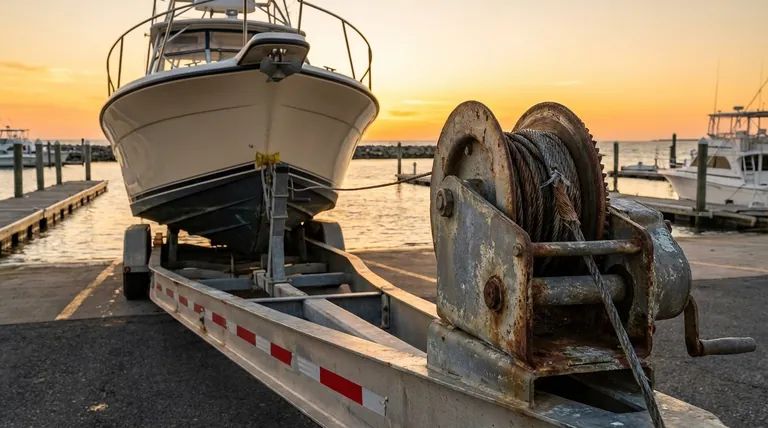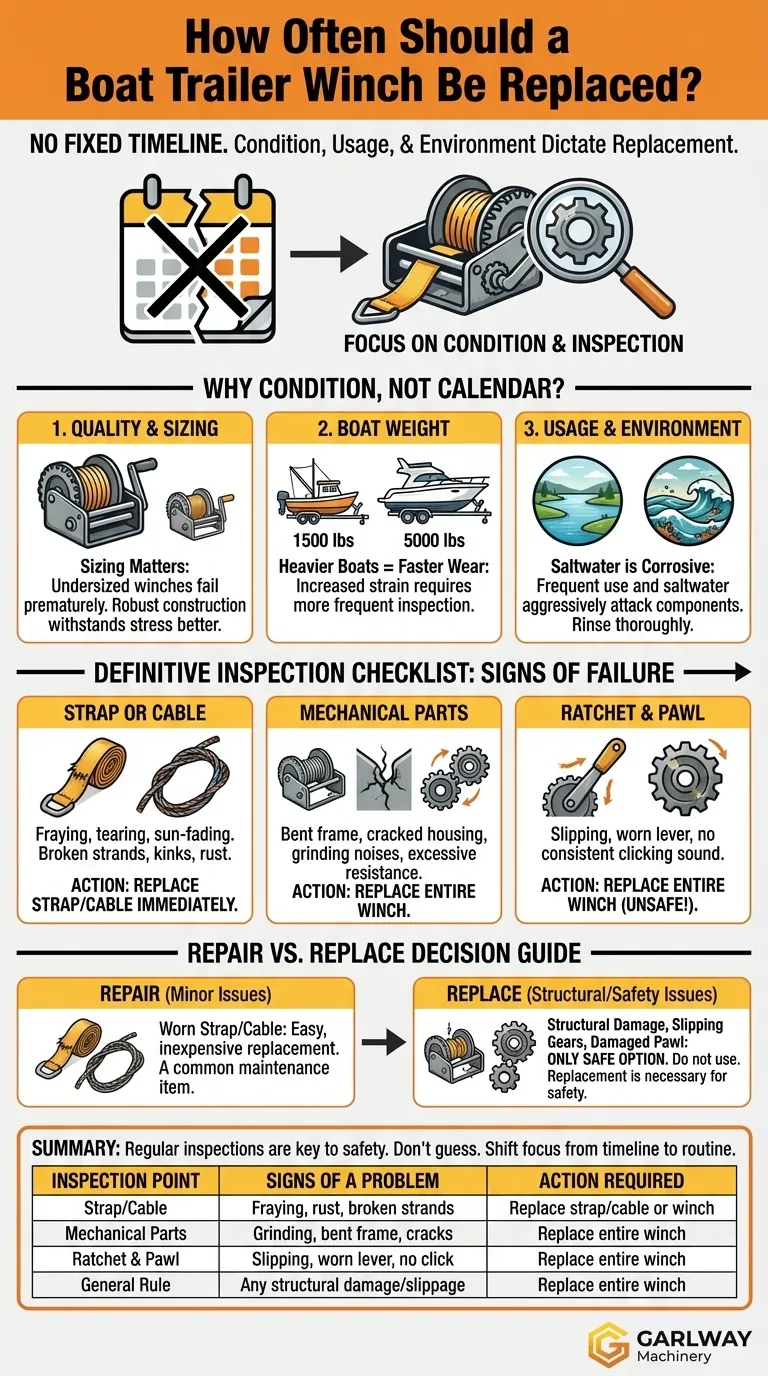There is no fixed timeline for replacing a boat trailer winch. Unlike a consumable part with a set service life, a winch's replacement is determined entirely by its condition, usage, and environment. A high-quality winch used infrequently in freshwater might last for decades, while a low-quality, undersized winch used weekly in saltwater could become unsafe in just a few seasons.
The core principle is this: A boat trailer winch does not have an expiration date. Its lifespan is dictated by visible wear and tear, and your only reliable guide is a consistent inspection routine.

Why Condition, Not the Calendar, Dictates Replacement
Thinking about winch replacement in terms of years is a common but misguided approach. The forces involved in pulling thousands of pounds of boat onto a trailer are significant. The safety and reliability of your winch depend on several key factors that directly impact its wear rate.
The Role of Winch Quality and Sizing
A winch's initial construction and capacity rating are the foundation of its longevity. A well-built winch with robust gears and a solid frame will naturally withstand stress better than a cheaper alternative. More importantly, an undersized winch is a winch that is doomed to fail prematurely, as it constantly operates at or beyond its intended limits.
The Impact of Boat Weight
The single greatest factor in winch wear is the load it has to pull. A winch pulling a 1,500-pound aluminum fishing boat experiences far less strain on its gears, frame, and strap than one pulling a 5,000-pound fiberglass cruiser. The heavier the boat, the more frequently and thoroughly you must inspect the winch.
The Influence of Usage and Environment
How often and where you boat plays a critical role. A winch used a dozen times a summer in freshwater will last significantly longer than one used every weekend in a saltwater environment. Saltwater is extremely corrosive and will aggressively attack metal gears, fasteners, and cable wires if not rinsed thoroughly after every use.
The Definitive Inspection Checklist: Signs of a Failing Winch
Instead of guessing based on age, perform this quick inspection every few times you use your boat. These are the clear, non-negotiable signs that a component, or the entire winch, needs immediate attention.
Inspect the Strap or Cable
This is the most common point of failure. Look for any signs of fraying, tearing, or sun-fading on a strap. For a steel cable, check for broken strands, kinks, or any signs of rust and corrosion. A compromised strap or cable can snap under load without warning.
Check the Mechanical Components
Examine the winch body itself. Look for any bent parts of the frame or cracked welds. Turn the handle and listen. If you hear grinding noises or feel excessive resistance or skipping, the internal gears are likely worn or damaged.
Test the Ratchet and Pawl
This is the critical safety mechanism that prevents the handle from spinning backward under load. As you crank the winch, it should make a solid, consistent clicking sound. If the pawl (the small lever that engages the gear) looks worn or slips even slightly, the winch is unsafe to use.
Understanding the Trade-offs: Repair vs. Replace
When you find a problem, you must decide whether to repair a single part or replace the entire unit.
When to Repair
Minor and isolated issues are often repairable. A frayed strap or a corroded cable can be easily and inexpensively replaced without needing a whole new winch. This is a common maintenance item.
When to Replace
Replacement is the only safe option if you find any structural damage, such as a bent frame, cracked housing, or severely rusted fasteners. Likewise, if the gears are slipping, stripped, or grinding, a full replacement is necessary. The cost of a new winch is insignificant compared to the cost of an accident or damage to your boat.
Making the Right Choice for Your Goal
Your proactive inspection is the key to ensuring safety at the boat ramp. Use these guidelines to make a clear decision based on what you find.
- If your primary focus is preventative maintenance: Replace a worn winch strap or cable before it shows severe signs of failure. This is the most cost-effective way to ensure safety.
- If you frequently launch in a saltwater environment: Make rinsing the winch with fresh water a non-negotiable part of your post-trip cleanup to dramatically extend its life.
- If your winch is undersized for your boat: Replace it with a properly-rated winch immediately, as its failure is a matter of when, not if.
- If you see any frame damage or the gears slip under load: Do not attempt to use the winch again. Replacement is your only safe course of action.
By shifting your focus from a timeline to a routine inspection, you take direct control over your equipment's safety and reliability.
Summary Table:
| Inspection Point | Signs of a Problem | Action Required |
|---|---|---|
| Strap or Cable | Fraying, tears, rust, broken strands | Replace strap/cable or entire winch |
| Mechanical Parts | Grinding noises, bent frame, cracked welds | Replace the entire winch |
| Ratchet & Pawl | Slipping, worn lever, no clicking sound | Replace the entire winch |
| General Rule | Any structural damage or gear slippage | Replace the entire winch for safety |
Ensure your boat ramp operations are safe and efficient with a reliable winch from GARLWAY.
As a specialist in construction machinery, we understand the critical importance of durable, high-capacity equipment that performs under heavy loads. Our robust winches are engineered for demanding applications, making them an ideal choice for contractors and construction companies who value safety and longevity in their equipment.
Let us help you select the right winch for your needs. Contact our experts today to discuss your requirements and discover the GARLWAY difference.
Visual Guide

Related Products
- Warn Winch Windlass Boat Trailer Winch
- Electric 120V Boat Winch by Badlands
- Heavy Duty Electric Boat Winch Windlass Anchor
- 12000 lb Heavy Duty Electric Boat Winch
- Electric Hoist Winch Boat Anchor Windlass for Marine Applications
People Also Ask
- What should operators regularly check regarding the hoist's electrical connections? Ensure Operational Safety & Prevent Hazards
- What safety features are present in electric hoists that are not in winches? Key Differences for Safe Lifting
- What are the key components inside the linear winch? Powering Your Heavy Lifting Needs
- What are the common applications of hand winches? Essential Uses for Construction, Marine & Off-Roading
- What is the difference between a drum winch and a capstan winch? Choose the Right Tool for Your Job
- How does a hoist differ from a winch in terms of operation? Choose the Right Tool for Your Job
- How can the speed of a winch be increased? Boost Productivity & Understand the Trade-offs
- What factors should be considered when choosing between a hand winch and an electric winch? Make the right choice for your job.














